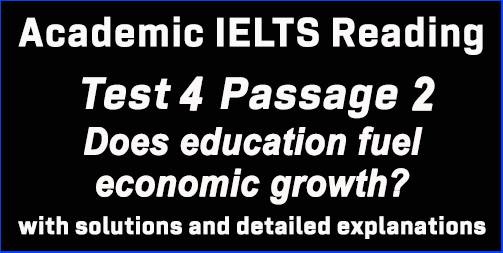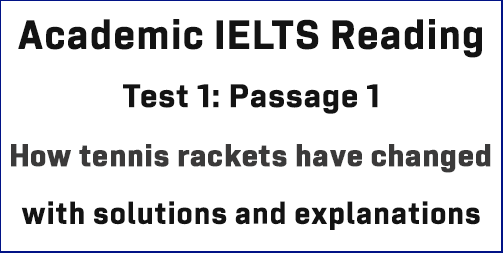IELTS Academic Reading: Cambridge 4 Test 2 Reading passage 2; ALTERNATIVE MEDICINE IN AUSTRALIA; with best solutions and best explanations
This Academic IELTS Reading post focuses on solutions to IELTS Cambridge 4 Reading Test 2 Reading Passage 2 titled ‘ALTERNATIVE MEDICINE IN AUSTRALIA’. This is a targeted post for IELTS candidates who have big problems finding out and understanding Reading Answers in the AC module. This post can guide you the best to understand every Reading answer without much trouble. Finding out IELTS Reading answers is a steady process, and this post will assist you in this respect.
IELTS Cambridge 4 Test 2: AC Reading Module
Reading Passage 2: Questions 14-27
The headline of the passage: ALTERNATIVE MEDICINE IN AUSTRALIA
Questions 14-15: Multiple choice questions
[This type of question asks you to choose a suitable answer from the options using the knowledge you gained from the passage. Generally, this question is set found as the last question set in most passages so you should not worry much about it. Finding all the answers to previous questions gives you a good idea about these questions.]
Question no. 14: Traditionally, how have Australian doctors differed from doctors in many Western countries?
Keywords for the question: traditionally, how, Australian doctors, differed, Western countries,
In paragraph no. 1 the author states in the first lines, “.. .. . Australia has been unusual in the Western world in having a very conservative attitude to natural or alternative therapies, according to Dr Paul Laver, a lecturer in Public Health at the University of Sydney.”
Here, having a very conservative attitude to natural or alternative therapies = have been reluctant to accept alternative therapists,
So, the answer is: C (They have been reluctant to accept alternative therapists.)
Question no. 15: In 1990, Americans –
Keywords for the question: 1990, Americans,
In lines 8-9 of paragraph no. 1, the author says, “ . .. . Americans made more visits to alternative therapist than to orthodox doctors in 1990, . .. ..”
Here, made more visits to alternative therapist than to orthodox doctors = consulted alternative therapists more often than doctors,
So, the answer is: B (consulted alternative therapists more often than doctors.)
Questions 16-23: YES, NO, NOT GIVEN:
[In this type of question, candidates are asked to find out whether:
The statement in the question matches with the claim of the writer in the text- YES
The statement in the question contradicts with the claim of the writer in the text- NO
The statement in the question has no clear connection with the account in the text- NOT GIVEN]
[TIPS: For this type of question, you can divide each statement into three independent pieces and make your way through with the answer.]
Question no. 16: Australians have been turning to alternative therapies in increasing numbers over the past 20 years.
Keywords for the question: Australians, turning to, alternative therapies, increasing numbers, over, past 20 years,
The answer to this question can be found in lines 1-2 in paragraph no. 2, “Disenchantment with orthodox medicine has seen the popularity of alternative therapies in Australia climb steadily during the past 20 years. .. .”
Here, popularity of alternative therapies = Australians have been turning to alternative therapies in increasing numbers, climb steadily = increasing slowly,
So, the answer is: YES
Question no. 17: Between 1983 and 1990 the numbers of patients visiting alternative therapists rose to include a further 8% of the population.
Keywords for the question: between 1983 and 1990, numbers of patients, visiting alternative therapists, rose, include, further 8% of, population,
Lines 2-5 in paragraph no. 2 gives us the answer to this question, “ .. . . In a 1983 national health survey, 1.9% of people said they had contacted a chiropractor, naturopath, osteopath, acupuncturist or herbalist in the two weeks prior to the survey. By 1990, this figure had risen to 2.6% of the population. .. . .”
The lines suggest that between 1983 and 1990 the numbers of patients visiting alternative therapists rose to include a further 0.7% of the population, not 8%.
So, the answer is: NO
Question no. 18: The 1990 survey related to 550,000 consultations with alternative therapists.
Keywords for the question: 1990 survey, related to 550,000 consultations, alternative therapists,
The answer can be found in paragraph no. 2. The author says here in lines 5-7, “ .. .. The 550,000 consultations with alternative therapists reported in the 1990 survey represented about an eighth of the total number of consultations with medically qualified personnel covered by the survey, . .. .”
Here, all the numbers/ figures in the paragraph match with the question.
So, the answer is: YES
Question no. 19: In the past, Australians had a higher opinion of doctors than they do today.
Keywords for the question: in the past, Australians, had, higher opinion of doctors, than, today,
Paragraph no. 2 has the answer to this question. Here, the author mentions in the final lines, “ . .. .. ‘A better educated and less accepting public has become disillusion with the experts in general and increasingly skeptical about science and empirically based knowledge,’ they said. ‘The high standing of professionals, including doctors, has been eroded as a consequence.’ . …”
These lines indirectly mean that Australian people had a higher opinion about doctors previously but nowadays the rate of high opinion has lowered.
So, the answer is: YES
Question no. 20: Some Australian doctors are retraining in alternative therapies.
Keywords for the question: some Australian doctors, retraining in, alternative therapies,
In paragraph no. 3, take a look at the first lines, “Rather than resisting or criticizing this trend, increasing numbers of Australian doctors, particularly younger ones, are forming group practices with alternative therapists or taking courses themselves, particularly in acupuncture and herbalism. .. . .”
Here, increasing numbers of Australian doctors = Some Australian doctors,
are forming group practices with alternative therapists or taking courses themselves = are retraining in alternative therapies,
So, the answer is: YES
Question no. 21: Alternative therapists earn higher salaries than doctors.
Keywords for the question: alternative therapists, earn, higher salaries, than doctors,
In paragraph no. 3, the writer says in line no. 4, “ . .. . Part of the incentive was financial, .. . .”
However, there is no comparison of the number of earnings between alternative therapists and orthodox doctors.
So, the answer is: NOT GIVEN
Question no. 22: The 1993 Sydney survey involved 289 patients who visited alternative therapists for acupuncture treatment.
Keywords for the question: 1993 Sydney survey, involved, 289 patients, visited, alternative therapists, acupuncture treatment,
The first lines of paragraph no. 4 say, “In 1993, Dr Laver and his colleagues published a survey of 289 Sydney people who attended eight alternative therapists’ practices in Sydney. These practices offered a wide range of alternative therapies from 25 therapists. .. .. .”
Here, a wide range of alternative therapies = more than one kind of therapies,
So, the answer is: NO
Question no. 23: All the patients in the 1993 Sydney survey had long-term medical complaints.
Keywords for the question: all the patients, 1993 Sydney survey, had, long-term medical complaints,
Once again, in paragraph no. 4, lines 3-4 say, “ . . .. .. Those surveyed had experience chronic illnesses .. ..”
Here, Those surveyed = all the patients in the 1993 Sydney survey, chronic illnesses = long-term medical complaints,
So, the answer is: YES
Questions 24-26: Labeling a diagram:
[In this type of question, candidates are asked to label a diagram with NO MORE THAN TWO WORDS from the passage. Keywords are important to find answers correctly. Generally, this type of question maintains a sequence. However, we should not be surprised if the sequence is not maintained. Find the keywords in the passage and you are most likely to find the answers.]

Question no. 24:
Keywords for the question: medical complaints, patients, visiting therapists, musculo-skeletal, digestive,
The answer can be found in paragraph no. 5. Here, take a look at lines 1-4 as the writer mentions here, “ .. . . According to the Australian Journal of Public Health, 18% of patients visiting alternative therapists do so because they suffer from musculo-skeletal complaints; 12% suffer from digestive problems, which is only 1% more than those suffering from emotional problems. . ..”
Here, if we compare the graph with the information in the passage, we shall find out that the rate for emotional problems is 11%.
So, the answer is: emotional / emotional problems
Question no. 25 & 26:
Keywords for the question: Keywords for the question: medical complaints, patients, visiting therapists, respiratory, candida, general health maintenance,
Again, the answers can be found in paragraph no. 5. In this paragraph, the author writes in lines 4-7, “ . .. .. Those suffering from respiratory complaints represent 7% of their patients, and candida sufferers represent an equal percentage. Headache sufferers and those complaining of general ill health represent 6% and 5% of patients respectively, and a further 4% see therapists for general health maintenance.”
Here, Headache sufferers and those complaining of general ill health represent 6% and 5% of patients respectively gives us the answers for questions 25 and 26.
So, the answers are:
25. headache / headaches
26. general ill health
Click here for solutions to Cambridge 4 Test 2 Reading Passage 1
Click here for solutions to Cambridge 4 Test 2 Reading Passage 3




One thought on “IELTS Academic Reading: Cambridge 4 Test 2 Reading passage 2; ALTERNATIVE MEDICINE IN AUSTRALIA; with best solutions and best explanations”